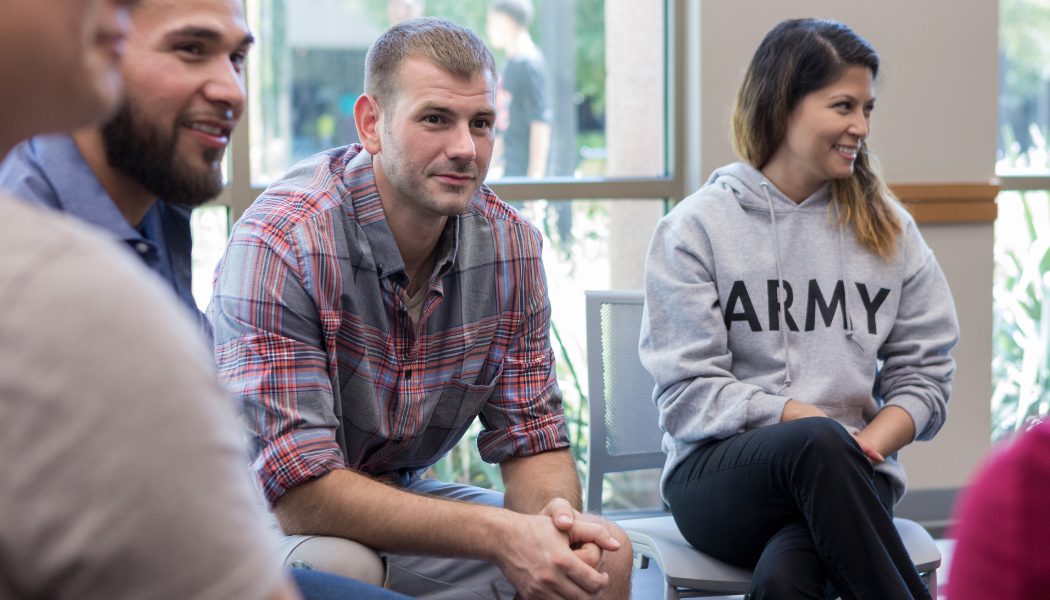While most veterans can successfully transition to civilian life, some do face significant challenges that may lead to involvement in the justice system.
Understanding these challenges and providing the appropriate support is essential for both prevention and rehabilitation. At Care after Combat, we work directly with these veterans, working to understand their situation and work with them to build a fulfilling future.
Understanding Veterans in the Prison System
Recent government statistics show that 3.6% of the UK prison population identifies as ex-service personnel. However, as Nacro and the University of Northampton’s 2024 research reveals, this number may not tell the full story due to significant identification barriers:
- Some veterans do not understand why they are being asked about their previous service when they become involved with the justice system and may fear what could happen as a result.
- Some veterans cite pride and feelings of self-reliance as reasons they have not asked for help.
- Misunderstanding of veteran status eligibility – a veteran is a veteran even if they have received one day’s pay from the military, and they are eligible for the same help.
- Finding and getting support can be complex, and veterans and practitioners have expressed confusion when it comes to what support is available and who is eligible.
This data tells us that the identification of veterans plays a much larger role in the support that veterans do or do not receive than may be believed. After all, no matter how great the support available to veterans is, this will not matter if veterans do not know how, or do not feel safe to make use of it.
Much of the solution to this seems to come down to communication and clarity from all parties. It is important that any support that is available to veterans, and who is eligible for this support, is made as clear as possible to veterans in the system.
It is also important that veterans are made to feel that disclosing their experiences in the military is safe and that reaching out for support is not something to be ashamed of – rather, it is a courageous act, the first step towards creating a fulfilling and happy life.
Other Statistics of Interest
Some prisons show notably higher concentrations of veterans:
- The Verne, Dorset: 12.1%
- Haverigg, Cumbria: 11%
- Usk, Monmouthshire: 10.4%
Furthermore, according to the Defence Analytical Services and Advice (DASA) research, veterans in UK prisons represent diverse age groups, with approximately half aged 18-44 and the remainder 45 years and above. Only 1% of incarcerated veterans were former officers, significantly under-representing the 14-17% of officers in regular service.
Unique Challenges Veterans Face
Veterans in the justice system face challenges that can complicate their rehabilitation and reintegration:
Mental Health and PTSD: Many veterans struggle with post-traumatic stress disorder (PTSD) and other mental health issues stemming from their service.
Identity and Purpose: Many veterans struggle with loss of identity after leaving service, particularly when facing incarceration. The structured military environment contrasts sharply with both civilian life and the prison system.
Rejoining/Entering the Civilian Workforce: Finding a civilian job after serving in the military can be tough. This is especially true for those who joined the armed forces at a young age and have never worked in a civilian job before. Knowing how different military skills may translate to civilian work experience can take time to figure out.
Personal Relationships: Families, friends, and partners may not be able to understand some of the experiences that their veteran loved one has had in the armed forces, which can be a very isolating feeling.
Community: After leaving the armed forces, many veterans miss the feeling of community that they once felt alongside their comrades who understood what it meant to be a part of the armed forces.
These root causes must be addressed when working with veterans on the path to rehabilitation, whether that means encouraging them to seek professional mental health support, gain a new qualification, or join groups and charities that allow veterans to connect with one another.
Life After Release
The journey doesn’t end at release. Veterans face additional challenges when reintegrating into society, including:
- Finding suitable housing
- Securing employment
- Maintaining mental health support
- Rebuilding family relationships
- Establishing new support networks
Success in these areas requires comprehensive, long-term support that understands both the veteran experience and the challenges of a post-justice system life. Organisations like Care after Combat provide this specialised support, helping veterans navigate each step of their journey back into society.
Care after Combat’s Role
Through our Project Phoenix program, we provide:
- One-to-one mentoring
- Help with rehabilitation and reintegration
- Ongoing support for at least 12 months post-release
This comprehensive approach helps veterans navigate the challenges of life after the justice system while building the skills and confidence needed for successful reintegration.
Making a Difference Together
Supporting veterans in the justice system requires a collaborative effort between organisations, institutions, and communities. Every veteran deserves the chance to rebuild their life, regardless of their circumstances.
If you’re interested in supporting veterans in the justice system or know someone who needs help, reach out to Care after Combat. Together, we can ensure that no veteran faces these challenges alone.

